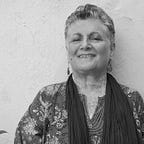The Online Retreat: Nourishing Virtual Togetherness
I am part of a group that follows the teachings of the Vietnamese Zen Buddhist teacher Thich Nhat Hanh. We are called Sanghas (a community of practitioners) and meet in small groups and as a full group to practice together. We organise Mindfulness Days for the general public and retreats for school children and teachers.
Every year, since the last three years, we have had a 4-day retreat of a Core group of the Sangha to deepen our practice and plan our activities and do outreach. Scheduled for April this year, it was clear towards the end of March that due to the Corona virus lock down, we were not going to be able to meet.
The organisers of the retreat, Shantum Seth and Gitanjali Seth — who are the representatives of Thich Nhat Hahn's work in India, under the Ahimsa Trust - proposed an online Zoom retreat. There was a Zoom meeting to discuss the possibility of such a retreat. I was a little sceptical. Having participated in a face-to-face Core Sangha retreat in 2018, I felt it would be hard to duplicate the synergy of being together physically.
But the consensus was to have a one-hour session every morning from 7–8 am and then from 2.30–6.30 pm. The schedule was built around the Buddha’s teachings and how we connected them to our practice.
The first morning, I rose at 6 am, set my intentions for the day (of a successful retreat day) and proceeded with my morning ablutions. I opened the doors of the house and let the fresh air in. I greeted my plants on the two first floor terraces and made a cup of tea. I set up my computer and checked my earphones. I plucked flowers and greens from the terrace and prepared a posy, setting it next to the little Buddha statue, I was set.
The hour went swimmingly, starting with a chant from the Plum Village (Thich Nhat Hanh’s retreat centre in France) and a guided meditation. We were in Noble Silence till 2.30 pm when we’d meet next. This meant not having to speak unless we had to. It also meant being peaceful and calm, breathing and connecting with ourselves.
I decided to start a retreat diary. I began to note what I ate, did and felt in the free hours of the retreat.
At lunch I recited the contemplations before eating.
“I thank the earth, sky and numerous living beings that worked hard to bring me this food. We eat in mindfulness and gratitude, in moderation without greed, and in a manner that reduces suffering of living beings and heals our precious planet.”
My husband and I ate in silence for 5 minutes chewing and concentrating on the contemplations.
The afternoon session started with guided deep relaxation for which I took to the couch Intended for the floor it’s a wonderful ritual for getting completely relaxed. This was followed by an orientation to the retreat and then mindful movements, to loosen up the joints.
Over the next three days we members of the Sangha guided us all through the practices of the Four Noble Truths, Eight-Fold Path, 5 Mindfulness Trainings, Earth Touchings and Beginning Anew. The day’s retreat closed with chants.
We took a tea break during which we prepared our own tea and a snack and then came back to the screen and continued.
I was pleasantly surprised how successful the retreat was. I enjoyed the intimacy of the earphones, with voices close and clear. Each of us were little boxes of rectangles across the screen and muted by the host till we asked to be recognised and spoke.
I began to think about the money we saved by not having to travel to one venue for the retreat; in not polluting the environment by not flying, taking trains and driving in cars; by not consuming fuel. How we could all stay home, in our environments and yet be together.
I also thanked the Corona virus for giving us an opportunity to be creative by having an online retreat.
My most favourite part of the retreat is the silence. I like being quiet.
As Thich Nhat Hanh says: Silence is something that comes from your heart, not from outside. Silence doesn’t mean not talking and not doing things; it means that you are not disturbed inside. If you’re truly silent, then no matter what situation you find yourself in you can enjoy the silence.
